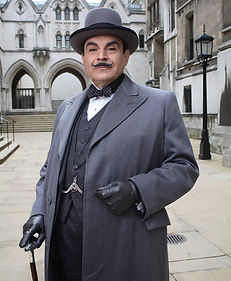DBE in Louisiana
The Extraordinary Little Man: Hercule Poirot
One hundred years ago, in 1916, Agatha Christie's Hercule Poirot was created to be released to the world in 1920. There followed a total of 33 novels, 1 play and 51 short stories.


Hercule Poirot was a member of the Brussels police force who fled to Belgium as a refugee during World War I. Arthur Hastings' description sums him up well . . .
"an extraordinary looking little man. He was hardly more than five feet four inches, but carried himself with great dignity. His head was exactly the shape of an egg, and he always perched it a little on one side. His moustache was very stiff and military. The neatness of his attire was almost incredible. I believe a speck of dust would have caused him more pain than a bullet wound."
Poirot admires women and is courtly to them, but remains a confirmed bachelor. His brain (the "little grey cells") solves crimes, not physical action. Turkish cigarettes and tisanes are his addictions. He is vain about his looks and dyes his hair and moustache to make him look younger


Agatha Christie's first Poirot novel, "The Mysterious Affair at Styles" was written in 1916. The Belgian detective first became famous in 1926 with "The Murder of Roger Ackroyd" with its surprising ending that provoked so much controversy that Edmund Wilson wrote his critique "Who Cares Who Killed Roger Ackroyd?" The 1937 novel "Death on the Nile" was considered by mystery novelist John Dickson to be among the ten greatest mystery novels of all time.
Poirot was the only fictional character to receive an obituary on the front page of the New York Times.
Poirot was persnickety about his personal finances, preferring to keep a bank balance of 444 pounds, 4 shillings and 4 pence.
Agatha Christie: "What a terrible mistake I made in starting with Hercule Poirot so old - I ought to have abandoned him after the first three or four books, and begun again with someone much younger. The result is that my fictional detective must be well over a hundred by now."